Choosing the Perfect Cage for Your Conure Parrot
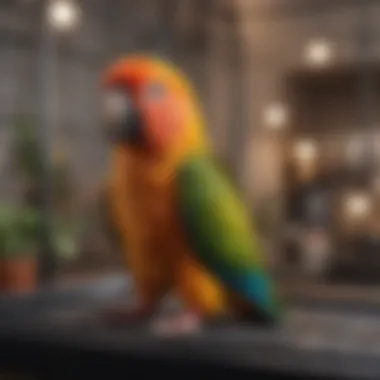
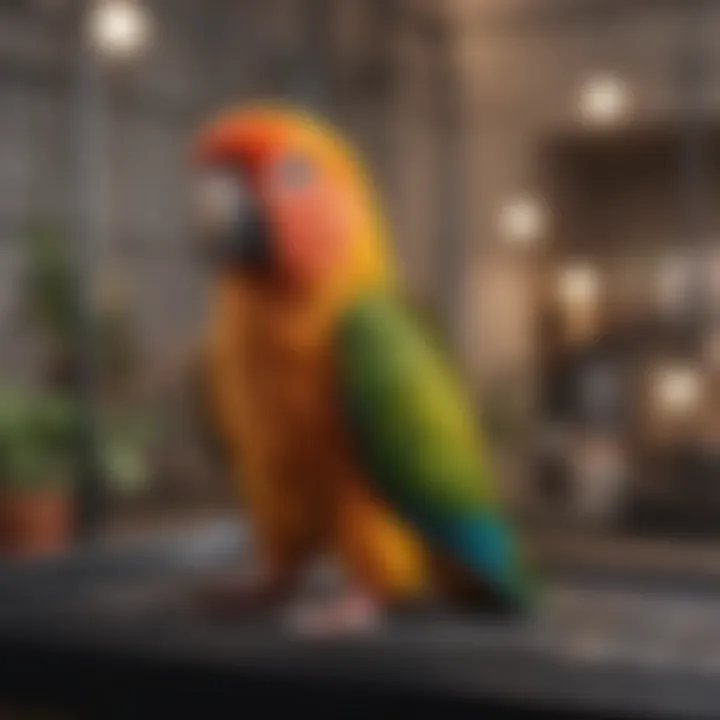
Intro
Understanding Your Pet
Pet Behavior Basics
Conures are intelligent and social creatures. They require interaction, mental stimulation, and space to move freely. Understanding their behavior is the first step in ensuring that their environment supports their needs. Observation of their social behaviors will guide you in creating a comfortable living space.
Common Breed Characteristics
Conures come in various species, such as Green-cheeked, Sun, or Jenday. Each type has unique traits, but they typically share a playful nature. They are known to be vocal and may express emotions through chirps or squawks. Recognizing these vocalizations can help you respond appropriately to their needs.
Species-Specific Needs
Different conures may have varied needs. For instance, larger species may require more space and larger bars to prevent escape. It's important to familiarize yourself with the specific characteristics of your conure's breed. This knowledge will facilitate the selection process for the right cage size and design.
The Importance of Cage Selection
When trying to choose the right cage for your conure, several factors should be considered:
- Size and dimensions to provide adequate space for movement.
- Bar spacing should prevent escape while allowing for easy climbing.
- Material durability to resist chewing and wear over time.
The right cage can significantly influence your conure's well-being. An undersized or poorly designed cage may lead to stress or behavioral issues.
Pet Care and Maintenance
Feeding Guidelines
A balanced diet is crucial for your conure's health. High-quality pellets, fresh fruits, and vegetables are essential. Always avoid toxic foods and provide fresh water daily.
Grooming Essentials
Regular grooming helps maintain your bird's health. This includes nail trimming and beak care. Each breed may require specific attention, so learn about the grooming needs of your conure.
Hygiene Practices
An unclean cage can lead to health issues. Regular cleaning of the cage and accessories is important. Use safe, non-toxic cleaners to avoid harming your pet.
Training and Development
Basic Commands and Skills
Training your conure can enhance your bond. Basic commands like 'step up' can be taught using positive reinforcement techniques. Consistency is key in this process.
Behavioral Training Techniques
Handling your conure gently and respectfully will make training easier. Understand their body language to know when they are receptive to training.
Addressing Common Behavior Issues
Be aware of issues such as excessive screaming or biting. Identifying triggers can help you mitigate these behaviors. Patience and understanding are essential in overcoming challenges.
Health and Wellness
Routine Vet Check-ups
Regular visits to an avian vet are necessary for your conure's health. Professional check-ups can help catch potential problems early.
Vaccination Needs
Vaccinations can protect your conure from common diseases. Make sure to discuss vaccination options with your veterinarian.
Recognizing Signs of Illness
Understanding signs of illness can save your conure's life. Look for changes in behavior, appetite, or droppings. Early detection is crucial for effective treatment.
Enrichment and Activities
Indoor vs. Outdoor Activities
Engaging your conure in both indoor and outdoor activities can enhance their quality of life. Supervised outdoor time can provide fresh air and new sights.
Interactive Toys and Games
Provide toys that challenge your conure mentally. For example, puzzle toys can keep their minds active and engaged. Rotate toys regularly to maintain interest.
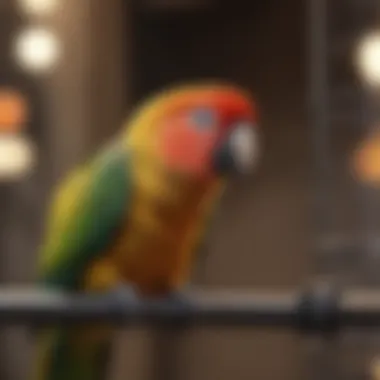
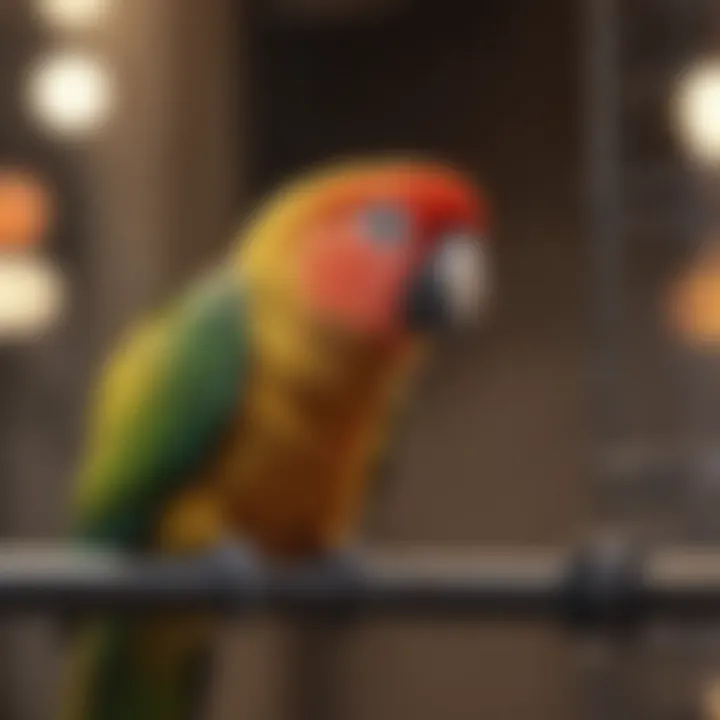
Socialization Opportunities
Socializing with your conure is vital. Encourage interaction with family members and other birds when possible. This promotes healthy social development and emotional well-being.
End
Choosing the right cage for your conure is just one aspect of pet ownership. Understanding their needs, maintaining proper care, and providing enrichment will contribute to a happy and healthy bird. This guide serves to help current and prospective conure owners make informed decisions, enhancing the lives of their feathered companions.
Understanding Conure Parrots
Understanding conure parrots is a critical first step for any potential owner or enthusiast considering bringing one of these vibrant birds into their home. Conures are not just pets; they are companions that require care, attention, and understanding. Their unique characteristics influence many factors in their lives, including cage selection, socialization, and overall well-being. Thorough knowledge about these birds aids owners in making informed decisions regarding their living environments, ensuring both physical and mental health needs are adequately met. This section is crucial, as it lays the groundwork for thoughtful and responsible ownership.
Species Overview
Conure parrots belong to the family Psittacidae. There are many different species within this group, including the Green-cheeked, Sun, and Blue-crowned conures. Each species has its own distinct features, colors, and characteristics, which influence their care requirements. For instance, the Green-cheeked conure is known for its playful nature and relatively quiet demeanor, while Sun conures are more boisterous and attention-seeking.
The variations among species also impact their size, with some conures being smaller than others. Recognizing and appreciating these differences is vital when selecting the right cage size and environment. Ensure that you research individual species to determine which may be the best match for your lifestyle, space, and personal preferences.
Behavioral Traits
Behavioral traits are pivotal in shaping how conures interact with their owners and their environment. In general, conures are known for being lively, intelligent, and social birds. Their inquisitive nature means they need stimulation and mental challenges to thrive. Boredom can lead to destructive behavior or even aggression. It is important to engage them in various activities and provide toys to prevent any negative behaviors.
Conures engage in different behaviors that signal their feelings. For example, a conure may puff its feathers or tilt its head when curious or excited. Similarly, they may vocalize loudly, indicating they are seeking attention. Understanding these signals can help owners provide appropriate responses and create a nurturing environment.
Social Needs and Interaction
The social needs of conure parrots cannot be overstated. These birds are inherently social creatures that require interaction with their flock, whether that be their human owners or other birds. Lack of social interaction can lead to feelings of loneliness, anxiety, and, in some cases, depression.
Consistent socialization is key. Spending time daily with your conure for bonding activities such as playtime and training will enhance their well-being. They thrive on positive interactions and are known to develop strong bonds with their human caretakers. Additionally, if you have multiple birds, fostering interaction with each other can mitigate loneliness but requires careful management to ensure harmony within the flock.
"Conures are more than just pets; they are social companions that thrive on interaction, stimulation, and love."
Choosing the right cage is influenced by the understanding of these social needs. The cage should facilitate engagement, provide room for toys, and allow for movement, affirming the conure's social nature while supporting their vibrant personality.
The Importance of Cage Selection
Selecting the right cage for your conure parrot is crucial. The choice of cage plays a significant role in the overall health and happiness of your bird. When choosing a cage, one must consider not only the physical structure but also how it affects the bird's daily life and well-being. A well-selected cage can foster a more enriching environment for your conure, allowing it to thrive in a domestic setting. The discussions in this section will focus on two primary aspects: the physical and psychological well-being of the bird, and how cage design impacts its behavior and activity levels.
Physical and Psychological Well-being
A suitable cage is fundamental for the physical health of conures. It needs to provide enough space for the bird to move around, stretch its wings, and engage in basic behaviors. A cage that is too small can lead to stress and physical problems like feather plucking or obesity. The size and layout of the cage affect the bird's ability to exercise and explore, both of which are vital for maintaining good health.
Additionally, the psychological aspects cannot be ignored. Conures are social creatures. They require stimulation and social interaction to avoid boredom and feelings of isolation. A cage that does not allow for interaction with toys, perches, and other birds can negatively impact their mood. Using non-toxic, enriching materials in the cage can promote a sense of safety and well-being. The cage serves as more than just a home; it is a habitat that reflects the needs and instincts of the bird.
Impact on Behavior and Activity Levels
The design and size of the cage directly influence a conure's behavior and activity levels. A larger cage encourages active play and exploration, fostering positive behaviors. In contrast, a cramped space may lead to lethargy or aggressive behavior due to frustration. The layout should promote activities such as climbing, swinging, and playing, allowing the bird to express its natural instincts.
Furthermore, cages should contain various accessories that cater to these needs. For instance, different perches at varying heights can encourage climbing, while toys can stimulate mental engagement. Without these elements, a conure may become bored, leading to destructive behavior or anxiety.
Cage Dimensions for Conures
Cage dimensions are an essential topic when selecting the right cage for your conure parrot. The size of the cage directly affects the physical and mental well-being of your bird. Conures are active and social creatures, requiring sufficient space to move around. A properly sized cage also allows for proper placement of accessories and enrichment items that enhance their living environment.
When considering the dimensions of your conure's cage, it is crucial to ensure that there is enough room for activity. A cramped space can lead to stress, behavioral issues, and physical health problems. For this reason, understanding minimum size requirements, as well as optimal dimensions, is vital.
Minimum Cage Size Requirements
The minimum cage size for a conure varies based on the specific species, but generally speaking, a basic guideline suggests at least 24 inches wide, 24 inches deep, and 36 inches tall. Some breeds, such as the Sun or Blue-Crowned Conure, may require larger dimensions due to their size and activity levels.
- Basic Rules for Minimum Size:
- Width: Minimum 24 inches
- Depth: Minimum 24 inches
- Height: Minimum 36 inches
These dimensions will accommodate essential movements like stretching wings and climbing. Crowding the bird in a smaller cage will hinder its natural behaviors. Therefore, always aim for larger cages if possible.
Optimal Horizontal and Vertical Space
While minimum size provides a baseline, optimal horizontal and vertical space can significantly enhance the quality of life for a conure. Conures are natural climbers and enjoy perching at different heights. Thus, a cage with ample horizontal space allows the bird to explore and engage in playful activities.
Horizontal Space
Having enough width is important for flight, play, and establishing a sense of territory. An optimal width of 36 to 48 inches is recommended for conures. This dimension encourages movement along the bars and provides room for toys, food dishes, and other enrichment items.
Vertical Space
Vertical space is equally important. Ideally, the height of the cage should be a minimum of 36 inches, extending up to 48 inches. This allows for the arrangement of multiple perches and platforms at varied heights. Conures thrive on climbing and enjoy having options to perch higher up.
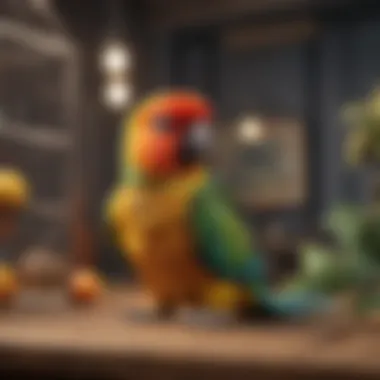
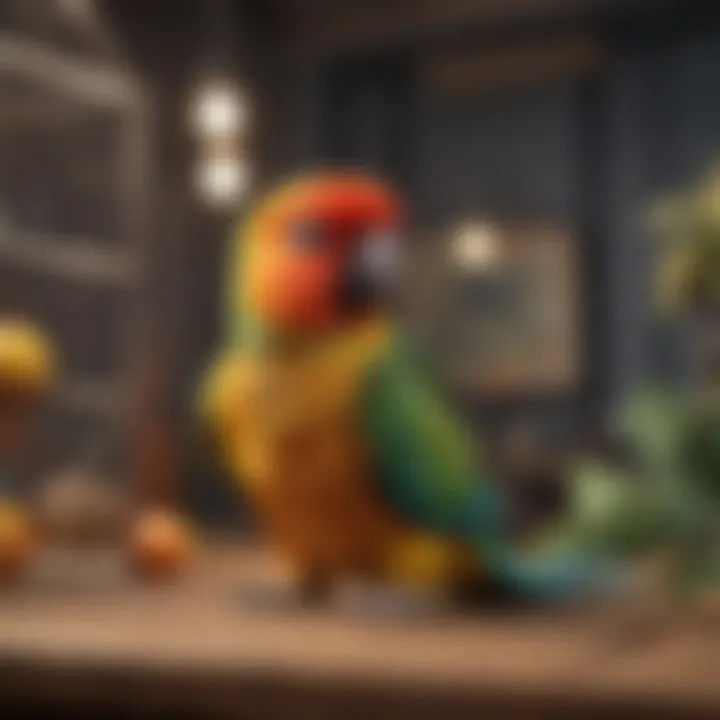
In summary, prioritize both horizontal and vertical dimensions to enhance the living environment for your conure.
Ultimately, the choice of cage dimensions should reflect not only the physical needs of the bird but also cater to its behavioral instincts. A well-dimensioned cage contributes to the overall happiness and health of your conure.
Types of Cages Available
When selecting a cage for your conure parrot, understanding the different types of cages available is crucial. Each type comes with unique attributes, benefits, and considerations that may affect your bird's quality of life. A well-chosen cage not only provides a home for your pet but also influences their behavior, safety, and overall well-being. This section will discuss the three primary types of cages for conures: wire cages, acrylic cages, and metal cages.
Wire Cages
Wire cages are among the most common options for housing conures. Their structure typically consists of a robust frame covered with wire mesh. One significant advantage of wire cages is their ventilation. The mesh openings allow ample airflow, which is essential for your bird’s respiratory health. Equally important is visibility; with a wire cage, conures can see their surroundings clearly, which helps reduce stress and prevents loneliness.
Another benefit of wire cages is their adaptability. Many models come with removable grate floors and pull-out trays, making cleaning a breeze. Cleaning practices are crucial for the hygiene of your pet's environment. However, bear in mind that the spacing between the wires should be narrow enough to prevent your conure from escaping or getting stuck.
On the downside, wire cages may not offer as much protection against drafts and temperature fluctuations compared to solid structures. Choosing a wire cage with appropriate features can mitigate these issues.
Acrylic Cages
Acrylic cages present an alternative to traditional wire models, offering a more modern and aesthetically pleasing look. These cages are typically made of transparent acrylic panels, providing a visually stunning habitat for your conure. The enclosed design often creates a unique environment that protects your bird from potential disturbances and drafts while allowing you to observe them easily.
A key advantage of acrylic cages is their ease of cleaning. The smooth surfaces can be wiped down without the need for an extensive scrubbing, which protects your bird from potential harmful residues. Furthermore, acrylic is a safer option for playful conures that might chew on their cage; it’s less likely to cause injury compared to sharp wire edges.
However, acrylic cages may restrict airflow, so it is important to ensure that your conure receives fresh air regularly. Proper placement near a natural airflow source can help counter this drawback. Additionally, these cages can be more expensive compared to their wire counterparts, which may be a consideration for pet owners on a budget.
Metal Cages
Metal cages, often made from stainless steel or powder-coated metal, provide a durable and long-lasting option for conure housing. They are generally designed to withstand the chewing tendencies of most birds, ensuring that the cage maintains its structure over time without becoming damaged.
One of the highlights of metal cages is their robustness. It offers a higher level of security compared to other materials, making them ideal for larger or more aggressive parrot species. Additionally, these cages tend to be heavier and sturdier, preventing any tipping or rocking that could alarm your bird.
However, metal cages can be more challenging to clean, especially if they have intricate designs or a larger surface area. Collecting droppings and food debris may require a bit more effort. Another potential concern is the type of metal used; some metals can be toxic to birds, so it’s essential to select a cage made from safe materials. Always verify product specifications to ensure they are non-toxic and suitable for conures.
"Choosing the right material for your conure's cage can significantly affect their health and happiness."
Material Considerations
Selecting appropriate materials for a conure’s cage is crucial for both safety and functionality. The cage’s materials not only affect the well-being of the bird but also impact the ease of maintenance and overall durability. It is essential to understand what materials are safe and beneficial for conures, ensuring a healthy living environment.
Non-Toxic Materials
When choosing a cage, the non-toxicity of materials is a key consideration. Conures are sensitive to certain chemicals and toxins that can be present in various metals and coatings. Popular non-toxic materials for bird cages include stainless steel and powder-coated metal, which do not contain harmful substances that can leach into the environment.
Choosing a cage made from non-toxic materials helps protect the conure from potential health issues. Materials like untreated wood can be safe if they have not been chemically treated, keeping the conure safe from toxins while providing natural textures to explore. Some synthetic materials can also be safe but must be thoroughly vetted, ensuring they are free from harmful chemicals.
Ease of Cleaning
Cleaning the cage is an essential part of conure ownership. The choice of material directly affects how easy it is to maintain. Stainless steel cages, for example, are not only durable but are also resistant to rust and corrosion, making them simple to clean. A quick wipe-down with a suitable cleaner can remove waste and grime without damaging the cage surface.
On the other hand, cages made from certain plastics or poorly coated metals might require more effort. They can stain or retain odors, making regular cleaning a tedious task. A cage that can be easily taken apart or has removable trays simplifies the process.
To summarize, consider the following when evaluating materials for a conure cage:
- Opt for non-toxic materials to ensure the health of your bird.
- Evaluate the ease of cleaning when selecting the cage type and material.
- Look for cages that have features like removable trays for simple maintenance.
Cage Accessories and Enrichment
Choosing the right cage is essential, but it is equally critical to provide cage accessories and enrichment for your conure parrot. These elements play a significant role in the overall well-being of your feathered companion. Accessories enhance their living environment and help simulate their natural habitat needs. They can also aid in preventing behavioral issues that arise from boredom and lack of stimulation.
Perches and Their Importance
Perches are vital for the health and comfort of conures. They provide a place to rest, play, and exercise. Choosing the right perch involves considering size, material, and placement. A variety of perches is crucial to promote foot health and prevent boredom. This can include natural wood perches, which allow for natural claw exercises, and different diameters to exercise their grip.
When selecting perches, ensure they are made from non-toxic materials. The placement of perches within the cage should mimic a bird's natural inclinations to perch at different heights. Additionally, consider adding some perches with varying textures to stimulate their feet. The more options provided, the more engaged your conure will be.
Toys for Mental Stimulation
Toys serve as crucial elements for keeping conures mentally stimulated. Birds are intelligent creatures that require regular interaction and play. Boredom can lead to destructive behaviors such as excessive vocalization or feather plucking. Therefore, selecting the right toys is essential for their mental health.
There are various types of toys available, such as foraging toys, chew toys, and puzzle toys. Foraging toys encourage natural scavenging instincts by hiding treats within them. This not only offers a reward but stimulates your conure's mind. Chew toys help maintain beak health, as they need to wear down their beaks naturally.
When selecting toys, ensure they are suitable for your conure's size and age. Regularly rotating toys keeps the environment fresh and exciting. Ensure to observe your bird’s play habits to see which toys capture their interest in particular and provide them with a stimulating and happy environment.
"Providing a variety of perches and toys can significantly enhance your conure's quality of life."
Placement of the Cage
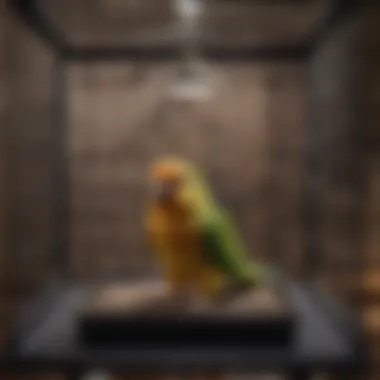
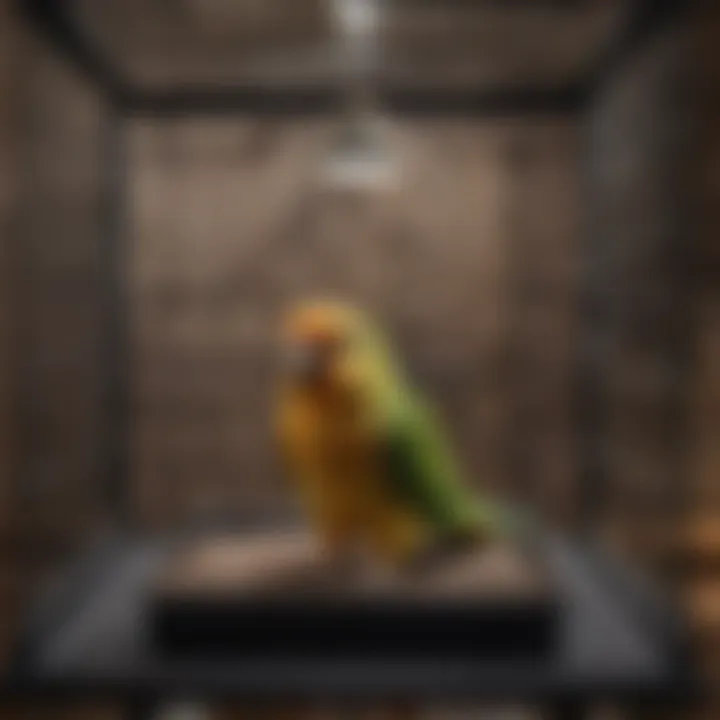
Selecting the right placement for your conure’s cage is not merely a matter of aesthetics; it has significant implications for the health and happiness of your bird. The location of the cage can affect your conure's behavior, level of stress, and overall well-being. Proper placement ensures that your conure can engage with their surroundings, receive enough natural light, and feel secure in their habitat.
Environmental Considerations
When determining where to place the cage, consider the environment surrounding it. Conures, like many other pet birds, thrive on interaction with their human family and exposure to ambient activities. Positioning the cage in a common area of the home can stimulate social interaction, which is vital for their psychological health. However, avoid placing it in direct sunlight for extended periods, as overheating can lead to serious health issues.
Additionally, consider the airflow in the area. Drafty locations can be uncomfortable and even dangerous for birds. Ensure that the cage is somewhere that is safe from drafts but also not too stagnant, as airflow helps maintain a healthy environment.
"Birds are naturally curious and social creatures, and their living environment should reflect that."
Safety and Accessibility
Safety is paramount when deciding on the cage location. Make sure it is out of reach from potential hazards like open windows, sharp objects, or any dangerous chemicals. Position the cage so that it is not near electrical cords and other items that a curious bird might try to chew on.
Accessibility is another important factor. The cage should be easy for you to reach. This makes daily routines, like feeding and cleaning, far more manageable. Ensure that the cage is high enough off the ground to feel secure but low enough for you to tend to the bird without strain. Your interactions should foster trust and comfort, and being able to easily access the cage will help maintain a positive bond with your conure.
In summary, consider both the environmental aspects and the safety of your conure when selecting a cage placement. By ensuring an engaging, safe, and accessible location, you lay the groundwork for a stable and enriching living environment for your feathered friend.
Maintenance and Care of the Cage
Choosing the right cage is essential for a conure's well-being, but equally important is maintaining it well. Cage maintenance and care ensure that your parrot lives in a clean and safe environment. Regular maintenance can prevent health issues and enhance your bird’s quality of life. An adequately maintained cage also contributes to the longevity of the cage itself, which is an investment over time. Here we explore key aspects of cage maintenance for your conure.
Regular Cleaning Practices
Regular cleaning is crucial for the health of your conure. A dirty cage can lead to bacterial growth and foul odors, which may frustrate both the owner and the bird. It is recommended to clean the cage at least once a week. More frequent cleaning may be needed, depending on your bird's habits and behaviors.
For effective cleaning, follow these steps:
- Remove all food, water, and accessories from the cage before cleaning.
- Use a non-toxic disinfectant to clean the surfaces. Ensure anything used is bird-safe, as some chemicals can be harmful.
- Scrub all surfaces, including the perches, toys, and food dishes.
- Rinse thoroughly to eliminate any residues.
- Dry the cage well before returning the accessories and your conure inside.
In addition to weekly cleanings, perform light cleaning daily. This involves removing leftover food, soiled bedding, and droppings. Such routine attention helps keep the living space tidy and reduces the chances of discomfort for your bird.
Inspecting for Wear and Damage
It is essential to routinely inspect the cage for wear and damage. This ensures not only the cage’s durability but also the safety of your conure. A damaged cage can pose serious risks, including escaping or injuring your pet.
During your inspection, focus on the following areas:
- Wires and Bars: check for bent or broken wires that could cause injury. If bars are too loose, your bird might be able to escape.
- Perches and Toys: examine them for wear. Wood perches can splinter, and toys can break down, making them dangerous if not attentioned.
- Cage Base: ensure the bottom is intact. If it has holes or cracks, your conure could reach areas that are unsafe.
- Hinges and Locks: make sure they function well so the cage remains secure and cannot be opened accidentally.
Set a regular schedule for your inspections, ideally paired with cleaning days, for systematic upkeep. A proactive approach to maintenance will secure your conure's health and happiness.
"Maintaining a clean and secure cage is fundamental for your conure's health. A little effort can lead to a massive difference in their well-being."
Taking care of the cage goes beyond the physical structure; it reflects the commitment of the owner to provide the best for their pet. Ensuring proper maintenance will ultimately lead to a more harmonious living environment for your feathered friend.
Common Mistakes in Cage Selection
Selecting the right cage for a conure parrot is not a simple task. Common mistakes can often lead to poor choices that affect the bird’s health and happiness. This section highlights crucial aspects deemed significant in cage selection. Awareness of these mistakes allows pet owners to make better-informed decisions.
Choosing an Inadequate Size
One of the most frequent errors is choosing a cage that is too small for the conure. Conures are active birds with high energy levels. They require adequate space to move, play, and exercise. An inadequate cage may lead to frustration, stress, and even health issues. Birds that feel cramped may exhibit behavioral problems such as excessive screaming or feather plucking.
When selecting a cage, the dimensions should accommodate the bird’s wingspan. A cage that is too narrow or short can restrict their natural behaviors. The minimum recommended size for a conure cage is usually around 24 x 24 x 30 inches. However, providing larger space is always better. This ensures your conure has room to explore and thrive. Consider the interior layout as well. The arrangement of perches and toys can affect how your bird utilizes the space.
Ignoring the Importance of Location
Another frequent misstep is neglecting the placement of the cage. The environment surrounding the cage impacts the bird's interaction with the world. A cage placed in a high-traffic area may cause stress due to excessive noise and movement. Similarly, isolation in a quiet corner might limit social interaction, which is essential for conures. They are social creatures that thrive on companionship.
The ideal location for a conure cage is in a room where the family spends time. It should not be directly in the sunlight, nor in a drafty area. Proper placement prioritizes the bird’s well-being as is critical for its behavior. Observing activities in the household can provide your conure with mental stimulation. In summary, careful consideration of size and location can profoundly affect your conure’s life. By avoiding these common mistakes, you enhance the environment for your feathered friend.
Remember, a well-chosen cage is vital to your conure’s happiness and health.
Final Thoughts on Cage for Conures
Choosing the right cage for your conure is a crucial step in ensuring their well-being. This decision influences various aspects of their life, including their physical health, behavior, and overall happiness. Conures are social and active birds. They require an environment that keeps them engaged and allows for natural behaviors. The cage is more than just a structure; it is their home, their play area, and their sanctuary.
Summary of Key Points
When selecting a cage, several key points should be considered:
- Cage Size: A spacious cage allows for movement and exercise. The minimum dimensions should meet or exceed the guidelines for conure species, ensuring they have enough room to stretch their wings.
- Material Choices: Cages made from non-toxic materials are essential to avoid health risks. Whether you choose wire, metal, or acrylic, make sure it’s safe.
- Cage Accessories: Perches, toys, and enrichment items enhance the living environment. Variety in accessories can prevent boredom and stress.
- Cage Placement: The position of the cage in your home can significantly affect your conure’s happiness. They thrive on social interaction and need a space where they can observe family activities but also feel secure.
The overall goal is to create an enriching environment that supports their physical and psychological needs.
Encouraging Informed Decisions
As a prospective pet owner or current conure guardian, it is essential to approach cage selection with a well-informed mindset. Take the time to research different cage options and consider how each one meets the specific needs of your conure.
- Visit Stores: Look at cages in person if possible. Assess the build quality and design, and consider how easy it will be to maintain.
- Online Resources: Utilize various online platforms. Websites like Reddit and Facebook groups for pet owners can provide invaluable insights. Many experienced owners share their tips and recommendations.
- Consult Experts: Speak with avian veterinarians or pet store specialists. Their knowledge can guide you towards making the right choices for your feathered friend.
Making an informed decision will contribute to a happier life for your conure. A good cage promotes not just physical safety but also emotional and mental well-being, leading to a thriving pet. Ultimately, your conure's cage reflects your commitment to their care.







